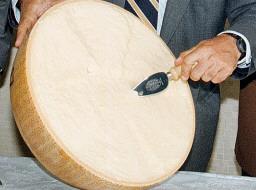A Berlin court on Wednesday ordered a German food company to stop making a product that mimics Italy's king of cheeses, Parmigiano Reggiano.
The Allgauland-Kaserein company will face fines of up to 250,000 euros if it is caught marketing German cheese bearing the labels 'parmigiano', 'bioparmesan' or 'parmesan', the court said.
The ruling is the first of its kind since the European Court of Justice (ECJ) decided in February that Germany violated European Union regulations protecting the authenticity of quality food by using the name 'parmesan' for a German cheese.
It is also likely to allay the fears of Italian farmers' and dairy associations who were concerned that part of the ECJ ruling would not provide sufficient protection for the Parmigiano Reggiano brand, which has the EU's Protected Designation of Origin (PDO) status.
Critics hit out at the ECJ's decision not to take any action against Germany for violating the EU regulations as well as a statement that safeguarding EU-protected specialities was up to the country of origin and not any country where the product, or imitations, were on sale.
But the Berlin case will go some way to calming concerns that upholding the regulations would not be seen as compulsory.
In the wake of the ruling, the director general of the Parmigiano Reggiano Consortium, Leo Bertozzi, urged customers to keep an eye out for copycat products on supermarket shelves.
''We ask people to report cases in Italy and abroad to us so we can both safeguard customers more effectively and make sure we eliminate from the market products that distort competition,'' he said.
The Parmigiano Reggiano Consortium has had to become increasingly assertive in defending its product's name from improper use.
It first scored a key legal victory five years ago when it managed to stop an American cheesemaker from using the Parmigiano tag on its grated cheese.
This was the fourth time in ten years that a US company had been forced to remove the label from its product.
In 2003, Italy lobbied to have cloned American parmesan denied permission to export worldwide.
The US product later failed in its bid to be admitted to the United Nations Food and Agriculture Organization's (FAO) Codex Alimentarius.
February's ECJ ruling was the result of a case brought against Germany by the European Commission, the EU executive, after the ECJ issued a non-binding opinion in 2002 that the word 'parmesan' can only be used to market the real thing.
Germany had argued that 'parmesan' had become a generic term for grated cheese.
Parmigiano Reggiano continues to be sold in cloned versions in South America, Japan and Britain, while in France 'parmesan' refers exclusively to the Italian cheese.
In Brazil a pirated version is marketed as Parmesao, while Argentina calls its fake parmesan Regianito.













